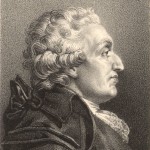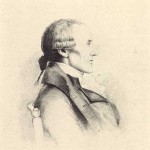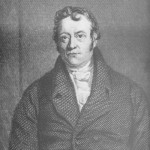Influences
It is not known exactly when Lafayette’s sympathies for “the black part of mankind” were first aroused. His earliest encounters with slaves were on American soil when he arrived to take part in the American Revolution in 1777 at the age of nineteen. Although he more than once suggests using black troops in the conflict, it is clear that he considers them “property,” at least as late as 1781. By 1783, however, he makes his remarkable proposal to Washington that they consider a joint venture for gradual emancipation. From that point onward, Lafayette’s definitions of liberty and equality extend to all men. In the years before the French Revolution, Lafayette was very active in the cause, joining various anti-slavery societies, corresponding with other advocates, and reading everything he could get his hands on, including works by the Marquis de Condorcet and noted British abolitionists Granville Sharp and Thomas Clarkson.
 The Marquis de Condorcet
The Marquis de Condorcet
Marquis de Condorcet to Lafayette, Basel, February 24, 1785
“I have just learned that you have honored my reflections on Negro slavery with your attention…
No one on our continent has helped more than you, Monsieur le Marquis, to break those chains with which Europe endowed America. Perhaps the glory of overthrowing the slavery that we have imposed on the unfortunate Africans is also demanded of you. You would be, then, the liberator of two of the four parts of the world…”
Allow me, Monsieur le Marquis, to offer you my limited understanding. In my Réflexions I told governments that did not listen to me what justice demanded of them, and I have thought it necessary to limit myself to that. But I have looked into the same subject in other respects, and if you deign to occupy yourself with the noble undertaking, you will find me always at your command.
As one of France’s great Enlightenment philosophers, the Marquis de Condorcet was very much opposed to slavery. The book referred to is his Réflexions sur l’esclavage des negres (Neufchâtel, 1781), which had been written to refute a justification of slavery published in Paris the year before. Condorcet’s work systematically challenged all justifications for slavery, including the argument that it was necessary for the continued viability of colonial economies.
 Granville Sharp
Granville Sharp
Lafayette to Granville Sharp, Paris, February 22, 1786
“While I am honoured with a flattering mark of your attention, I beg leave to present my grateful acknowledgements for this favour, and to express my regard for the virtuous and able advocate in the cause of liberty—the very valuable books now in my possession are a treasure of enjoyments for the mind…
And I heartily wish with you, while circumstances have made us in many respects superior to our black brethren, that we may cease to place ourselves beneath them in the pursuit of this disgraceful trade…”
In a New Year’s letter to John Adams in 1786, Lafayette asked Adams, then the American minister to Britain, to send him “everything that has been written in England” on the suppression of slavery. Adams arranged for British abolitionist Granville Sharp to send Lafayette the shipment of his writings on slavery that is acknowledged in the letter above. Sharp was almost single-handedly responsible for the first great victory of the anti-slavery movement in England—the 1772 decision that declared any slave setting foot on English soil to be free. Sharp was also instrumental in establishing the colony of Sierra Leone as a refuge for freed slaves in the late 1780s.
 Thomas Clarkson
Thomas Clarkson
Lafayette to Thomas Clarkson, Lhemkhul Near Plon, January 27, 1798
“While I did cooperate with you in our African concerns, you saw what opposition we had to encounter namely from the French Aristocrats and the Jacobine leaders of that time—Procrastination became necessary, yet I was ashamed to tell foreigners how necessary it had been—But I told you that in our doctrine of liberty you could confidently anticipate a speedy destruction of the slave trade, and an enfranchisement of the negroes which I wished to be gradual—How the measure has since been hurried and to what effect you have seen—To what intent God knows …
I hope a peace is not far distant wherein almost all the maritime powers are concerned—What better atonement can be devised for the calamities and the crimes of this war than to insert a formal article which shall at once put a stop to the infamous trade, and promote, as well as we can, the restoration of our negroe brethren to the rights of men? What Christian government would oppose it?”
One of the strongest voices raised against the evils of the slave trade was that of Thomas Clarkson, who had become obsessed with abolition during the writing of a prize-winning essay at Cambridge University in 1785. An Essay on the Slavery and Commerce of the Human Species, Particularly the African was published in several editions. Clarkson and Lafayette became acquainted through abolitionist organizations in Britain and France, but their friendship blossomed when Clarkson was sent to Paris in 1789 to try to persuade the National Assembly to include abolition of the slave trade in the reforms they were contemplating. During the six months Clarkson was in Paris, the two had frequent conversations and Lafayette even provided protection to Clarkson when his life was threatened. The letter above was written by Lafayette soon after his release from prison in Austria, where he had spent five years in the aftermath of the French Revolution. Lafayette alludes to the action of the French Convention in abolishing slavery on February 4, 1794.
Lafayette to Thomas Clarkson, La Grange, September 20, 1823
“So now you are attacking slavery itself. God bless you, and grant you success. The United States five excepted, have abolished it. You have been pleased to mention an attempt for gradual emancipation which, individual as it was, might have done some good had not the revolutionary storm of August 92 put an end to the experiment. The French convention by uncautious measures turned a good principle into evil both for black and white men. Yet after the cruel tempest was over, to which an iniquitous Bonapartian reaction added new horrors, you see in the present state of Hayti not only an encouraging specimen of negroe civilization, but a forcible argument in favor of emancipation, and perhaps a vent to conciliate a part of the difficulties.
1500 petitions to Parliament signed by a million and a half Britons is a most glorious event: I give you joy, my dear Clarkson, to have lived to promote and witness it.”
The friendship between Lafayette and Clarkson continued throughout Lafayette’s lifetime. Clarkson made several more visits to France and the two exchanged many letters as they kept watchful eyes on the progress of the abolition movement in Europe. In this letter of 1823, Lafayette is overjoyed that Clarkson’s efforts are now concentrated on abolishing slavery itself rather than the slave trade. He erroneously declares that all but five of the United States have abolished slavery, when, in actuality, twelve states allowed slavery. Lafayette’s reference to Haiti is prescient, since Haiti received her independence from France two years later. Clarkson, who outlived Lafayette by twelve years, wrote to a friend in 1842 about Lafayette: “He was a true friend of the cause.”
